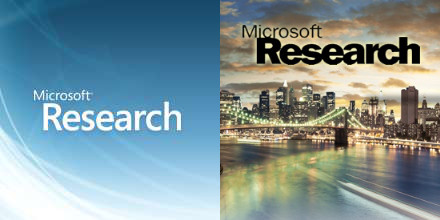Microsoft Research Postdocs for 2014
POSTDOCS IN COMPUTATIONAL SOCIAL SCIENCE, ONLINE EXPERIMENTAL SOCIAL SCIENCE, ECONOMICS AND COMPUTATION, MACHINE LEARNING
Microsoft Research NYC [ http://research.microsoft.com/newyork/ ] seeks outstanding applicants for 2-year postdoctoral researcher positions. We welcome applicants with strong quantitative and computational skills and a strong academic record in the following areas:
* Computational social science: http://research.microsoft.com/cssnyc
* Online experimental social science: http://research.microsoft.com/oess_nyc
* Economics and computation: http://research.microsoft.com/algorithmic-economics/
* Machine learning: http://research.microsoft.com/mlnyc/
We will also consider applicants in other focus areas of the lab, including information retrieval. Additional detail about these areas is included below. Please submit all application materials by December 13, 2013. Instructions are here: http://research.microsoft.com/en-us/jobs/fulltime/postdoc.aspx#NYC
SPECIAL NOTE TO DECISION SCIENCE NEWS READERS
- MSR-NYC is a highly quantitative place. For the social science postdocs, applicants should have strong competence in computer programming, math, or statistics at the level of someone with a Bachelor’s or Master’s degree in CS, math, or stats. Simply meeting the stats requirements in a social science PhD program would not be enough to be considered.
- In additional to having computational or mathematical skills, only applicants with computational or statistical research interests will be considered.
- These are thoroughly academic positions. They are good preparation for a career in academia (often taken to defer starting a professorship by a year or two) and are not intended for students looking to move into industry.
COMPUTATIONAL SOCIAL SCIENCE
http://research.microsoft.com/cssnyc
With an increasing amount of data on every aspect of our daily activities — from what we buy, to where we travel, to who we know — we are able to measure human behavior with precision largely thought impossible just a decade ago. Lying at the intersection of computer science, statistics and the social sciences, the emerging field of computational social science uses large-scale demographic, behavioral and network data to address longstanding questions in sociology, economics, politics, and beyond. We seek postdoc applicants with a diverse set of skills, including experience with large-scale data, scalable statistical and machine learning methods, and knowledge of a substantive social science field, such as sociology, economics, psychology, political science, or marketing.
ONLINE EXPERIMENTAL SOCIAL SCIENCE
http://research.microsoft.com/oess_nyc
Online experimental social science involves using the web, including crowdsourcing platforms such as Amazon’s Mechanical Turk, to study human behavior in “virtual lab” environments. Among other topics, virtual labs have been used to study the relationship between financial incentives and performance, the honesty of online workers, advertising impact as a function of exposure time, the implicit cost of “bad ads,” the testing of graphical user interfaces eliciting probabilistic information and also the relationship between network structure and social dynamics, related to social phenomena such as cooperation, learning, and collective problem solving. We seek postdoc applicants with a diverse mix of skills, including awareness of the theoretical and experimental social science literature, and experience with experimental design, as well as demonstrated statistical modeling and programming expertise. Specific experience running experiments on Amazon’s Mechanical Turk or related crowdsourcing websites, as well as managing virtual participant pools is also desirable, as is evidence of UI design ability.
ECONOMICS AND COMPUTATION
http://research.microsoft.com/algorithmic-economics/
Market design, the engineering arm of economics, benefits from an understanding of computation: complexity, algorithms, engineering practice, and data. Conversely, computer science in a networked world benefits from a solid foundation in economics: incentives and game theory. Scientists with hybrid expertise are crucial as social systems of all types move to electronic platforms, as people increasingly rely on programmatic trading aids, as market designers rely more on equilibrium simulations, and as optimization and machine learning algorithms become part of the inner loop of social and economic mechanisms. We seek applicants who embody a diverse mix of skills, including a background in computer science (e.g., artificial intelligence or theory) or related field, and knowledge of the theoretical and experimental economics literature. Experience building prototype systems, and a comfort level with modern programming paradigms (e.g., web programming and map-reduce) are also desirable.
MACHINE LEARNING
http://research.microsoft.com/mlnyc/
Machine learning is the discipline of designing efficient algorithms for making accurate predictions and optimal decisions in the face of uncertainty. It combines tools and techniques from computer science, signal processing, statistics and optimization. Microsoft offers a unique opportunity to work with extremely diverse data sources, both big and small, while also offering a very stimulating environment for cutting-edge theoretical research. We seek postdoc applicants who have demonstrated ability to do independent research, have a strong publication record at top research venues and thrive in a multidisciplinary environment.



